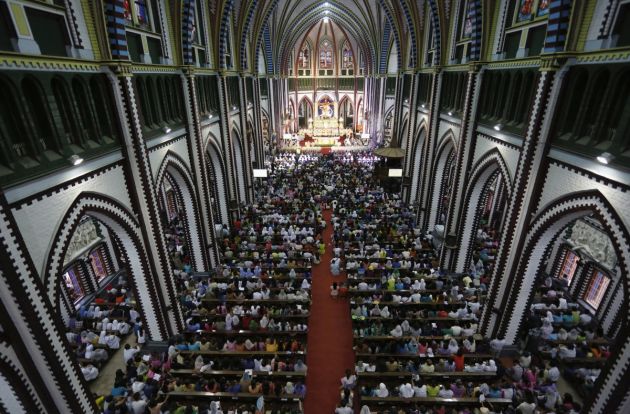Myanmar Christians endure frequent junta violence often with attacks on churches

Christians in Myanmar are enduring frequent violence with around 75 churches being severely or partially destroyed in attacks by the junta since the military coup on Feb. 1, 2021.
Soldiers regularly raid church institutions including places of worship under the pretext of looking for suspected rebels and often resort to violent destruction, UCA Catholic news reported on April 20.
Western Myanmar's Chin state has a Christian majority and 62 religious structures have been destroyed - the biggest number of any single state or region.
The attacks included 22 buildings burned down and 20 more demolished by artillery blasts, the Institute of Chin Affairs, a human rights organization reports.
Christians make up almost 90 percent of impoverished Chin state's 478,801 people, according to the 2014 census in Myanmar, which is also called Burma..
The UN Office for the Coordination of Humanitarian Affairs says that at least 8,262 houses and other civilian properties, including churches, monasteries, schools, and markets, have reportedly been either burned down or destroyed in Chin and Kayah states and in the Sagaing and Magway regions.
WOMEN AND CHILDREN
Around 912,700 men, women and children were displaced across the conflict-torn nation as of April 11.
This includes 566,100 people displaced due to the ongoing conflict, with the northwest region accounting for over 300,000 people for the first time, according to OCHA.
Christian-majority Chin and Kayah states have stood at the forefront of resistance to the junta forces and have experienced violent military attacks including airstrikes, heavy artillery bombardements, and indiscriminate attacks on civilians
"Ongoing fighting in the country's east and northwest has exacerbated the humanitarian and displacement situation," the UN organization said in a report on April 19.
It said the use of heavy weapons including airstrikes and artillery fire, as well as landmines and the pressure of explosive remnants of war, continues to claim lives and pose risks to the safety and security of the civilian population, especially internally displaced people.
UN Human Rights chief Michelle Bachelet had told the 49th session of Human Rights Council on March 21 that Myanmar's humanitarian crisis continues to expand as systematic brutality by security forces known as the Tatmadaw, has inflamed pre-existing armed conflicts in multiple ethnic states.
"The economy is on the brink of collapse. Over 14.4 million individuals are now assessed as being in humanitarian need", said Bachelet, predicting that "food scarcity will sharply increase over the coming months."
The UN rights chief said, "Over 400 Tatmadaw attacks on populated areas involved property destruction, destroying thousands of houses and other buildings including churches and food stores and laying of landmines."
The worst attack in Kayah state was reported from Sacred Heart Church in Kanyantharyear, a village near Loikaw, on May 23, 2021 with four members of the congregation killed and eight others wounded in artillery shelling, reported UCA.
Kayah state is remote and mountainous, and is regarded as a stronghold of Catholicism in the Buddhist-majority country.
About 90,000 Catholics live in the state with a population of 355,000.
Christian-majority Chin and Kayah states have also been at the forefront of resistance to the junta and have experienced fierce military attacks, including airstrikes, heavy artillery shelling and indiscriminate attacks on civilians.
At least 1,700 people in Myanmar have lost their lives in the military crackdown and over 13,000 people have been detained since February 2021.
Of Myanmar's population of some 57 million, almost 88 percent are Buddhist, 6.2 percent Christian and 4.3 percent Muslims.